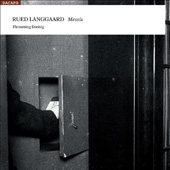

It has taken me about a year of listening and re-visiting this recording since its release to finally make up my mind and now decide (August 2010) to list it on this
website as a "Definitive" recording. It took me this long to come to a final decision simply because all this time I kept thinking: "This is a 2 hour long organ work
by a 20th century Danish composer. No one will care. It can't possibly measure up to choral music by Bach, a Mahler Symphony or a Chopin Prelude." But in the end it does. It might
not contain perfect counterpoint like Bach's music, or be on an epic scale like a Mahler work, or convey human emotions like a Chopin piece, but at its core, this is the
kind of musical composition that is the essence, the raison d'Ítre, behind what being a composer is all about.
Rued Langgaard (1893-1952) was a passionate Late Romantic and a proponent of Symbolism in music, much like Scriabin and others were. Therefore
most of his symphonic work was ignored by the musical establishment of the day, and only over the last 40 years or so with the ever expanding record labels and
recordings, has there been a renewed interest in this unjustly neglected Danish composer.
As mentioned before, Messis (The Time of Harvest), in the end of the world sense, is a two-hour long pipe organ trilogy. Its three parts consist of
Messis, Juan, and Buried in Hell. It is loaded with philosophical concepts and symbolism, both musical and religious. According to the excellent booklet notes by Bendt
Viinholt Nielsen, "Langgaard believed that the time around 1900 was a fateful epoch for man as a cultural being, and that the beauty-seeking music of the age pointed
forward to the coming consummation and end of the world. This is not just a matter of nostalgia, but an idea that present-day, meaningful music must seize the moment
and clarify the spiritual potential of the post-Romantic musical idiom." As pointed out earlier, this type of composition lies at the very core of a composer's output, in that
it is meant to express, with sound, profound concepts and deep spirituality. This work in particular has many moments where the melody or the leading motif will haunt
your mind for quite a while after audition. Like a mermaid's call, out of nowhere, I would hear part of it in my head, beckoning me to listen to it again. There is a strong
thread throughout the whole work that ties everything together from start to finish into a very cohesive package. Now mind you, I myself am an organist and I do admire
early 20th century composers, so my opinion of this music may be pre-determined somehow, but as mentioned before, it took me a while to warm to this piece of music,
but now I just can't do without it. For more detailed information on this composer, click here
to visit a website on Rued Langgaard.
This is organist Flemming Dreisig's second recording of this work, and therefore his understanding of its structure and meaning is second to none. His
choice of registration and various stops from the softest Vox humana to the loudest 32' Tuba in the pedal of this Copenhagen Cathedral organ is always well planned. The
Dacapo recording captures the space of the venue very well and never cracks under the pressure of this powerful instrument.
Jean-Yves Duperron